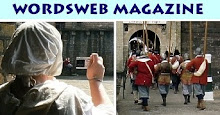Saturday, 10 November 2007
Monday, 29 October 2007
Thanks for the Memory
Bob Hope, 1903-2003
I recently visited the Bob Hope Theatre in Eltham, near my former home in south-east London, where Bob was born in 1903.The theatre was closed on the day of my visit but I received a warm welcome from staff who reminded me of the support they received over the last two decades from the famous entertainer, who died last year.
 The Eltham Little Theatre Company was in financial difficulties and due to close when Bob Hope first visited in 1980, but a donation of £58,000 raised by the Bob Hope Classic British Golf Tournaments in 1980-81,which enabled them to buy the old church hall where they had been staging their productions and refurbish it as ‘The Bob Hope Theatre’.
The Eltham Little Theatre Company was in financial difficulties and due to close when Bob Hope first visited in 1980, but a donation of £58,000 raised by the Bob Hope Classic British Golf Tournaments in 1980-81,which enabled them to buy the old church hall where they had been staging their productions and refurbish it as ‘The Bob Hope Theatre’.
The star attended the naming ceremony in 1982 and visited again in 1991, when he donated a further £28,000, this time from a London Palladium performance, which paid for the building of a bar extension and other refurbishment.In 1998 Queen Elizabeth II conferred on Bob Hope the honour of Knight Commander of the Most Excellent Order of the British Empire - the highest award for a citizen of another country - which he received at a ceremony at the British Embassy in Washington on May 17th 1998. Jim Shepherd, Honorary Secretary of the theatre, also attended, invited by the family.
Members of Bob’s family and staff continued to visit Eltham whenever they were in London and the news of his death was received with sadness here, as in his adopted country and the rest of the world. He will be long remembered in the town of his birth, which he left at the age of four when his family emigrated to the USA and achieved international fame, but never forgot his roots. Bob always said he was born in "Eltham, Kent", which it was before boundary changes brought it officially into Greater London.
© 2004 Arthur Loosley
Originally published in Wordsweb Magazine
I recently visited the Bob Hope Theatre in Eltham, near my former home in south-east London, where Bob was born in 1903.The theatre was closed on the day of my visit but I received a warm welcome from staff who reminded me of the support they received over the last two decades from the famous entertainer, who died last year.
 The Eltham Little Theatre Company was in financial difficulties and due to close when Bob Hope first visited in 1980, but a donation of £58,000 raised by the Bob Hope Classic British Golf Tournaments in 1980-81,which enabled them to buy the old church hall where they had been staging their productions and refurbish it as ‘The Bob Hope Theatre’.
The Eltham Little Theatre Company was in financial difficulties and due to close when Bob Hope first visited in 1980, but a donation of £58,000 raised by the Bob Hope Classic British Golf Tournaments in 1980-81,which enabled them to buy the old church hall where they had been staging their productions and refurbish it as ‘The Bob Hope Theatre’.The star attended the naming ceremony in 1982 and visited again in 1991, when he donated a further £28,000, this time from a London Palladium performance, which paid for the building of a bar extension and other refurbishment.In 1998 Queen Elizabeth II conferred on Bob Hope the honour of Knight Commander of the Most Excellent Order of the British Empire - the highest award for a citizen of another country - which he received at a ceremony at the British Embassy in Washington on May 17th 1998. Jim Shepherd, Honorary Secretary of the theatre, also attended, invited by the family.
Members of Bob’s family and staff continued to visit Eltham whenever they were in London and the news of his death was received with sadness here, as in his adopted country and the rest of the world. He will be long remembered in the town of his birth, which he left at the age of four when his family emigrated to the USA and achieved international fame, but never forgot his roots. Bob always said he was born in "Eltham, Kent", which it was before boundary changes brought it officially into Greater London.
© 2004 Arthur Loosley
Originally published in Wordsweb Magazine
Friday, 26 October 2007
Newspaper Stamps - now just a memory

One of the age-old problems faced by journalists, and even more so by news photographers before the advent of instant electronic communication, was how to get the story or picture back to the office in time to meet the edition deadline. The coming of the railways proved a great help, not only for the journalists but also for distributing the papers throughout the country. Railway companies printed their own stamps, primarily for transporting newspapers but also used by freelance photographers and news agencies as the fastest way of getting their pictures to London and other publishing centres.
I was based in Derby for a few years and used the stamps when sending packets to London, 125 miles away, by regular passenger services. Wholesale newspaper distribution by rail continued to grow, and by the early 1970s there were about 60 dedicated newspaper trains but these were discontinued in later years when economic considerations and trade union practices forced a change to road haulage. The system is only of academic interest now that news photographs are so easily delivered by e-mail.
The stamps shown here are from my own collection, rescued from the waste paper bin at The Times. These examples date from the introduction of decimal currency as can be seen by the new values overprinted on older issues.
Labels:
news,
newspaper,
photographers,
photographs,
railways,
stamps,
trains
A Restored Picture Palace
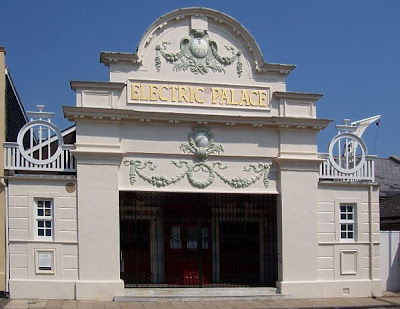
In my childhood we did not speak of the 'cinema' but the 'Picture Palace', and the opulent façades of these buildings matched their fanciful names. Sadly, most are now gone, but a few have been lovingly restored by volunteers.
The Electric Palace in Harwich, Essex, was built in 1911, closed in 1956, and rescued, refurbished and reopened in 1981 after 25 years of disuse. One of the oldest purpose-built cenemas still showing films, it has separate entrances for sixpenny and one shilling admissions (2.5p and 5p today!)

Labels:
cinema,
harwich,
picture palace,
shilling,
sixpence
Playing Soldiers or Preserving History?
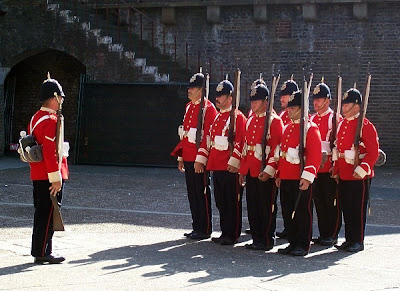
I took this photograph at Landguard Fort in Felixstowe, Suffolk which guarded the East Coast of England and two major river estuaries from the time of Henry VIII until the military finally moved out in the 1950s. Army, Navy, Marines and the Royal Air Force have all occupied the fort at various times.
Now managed by a charitable trust the fort holds regular re-enactments of various periods in its long history. The enactors take it very seriously, basing their displays on original drill books.
Landguard is the only fort to have defeated a full-scale invasion attempt on our shores. That was in 1667, when Captain Nathaniel Darell and his 500 men beat off a Dutch invasion force. The historic event is still celebrated annually.
Now managed by a charitable trust the fort holds regular re-enactments of various periods in its long history. The enactors take it very seriously, basing their displays on original drill books.
Landguard is the only fort to have defeated a full-scale invasion attempt on our shores. That was in 1667, when Captain Nathaniel Darell and his 500 men beat off a Dutch invasion force. The historic event is still celebrated annually.
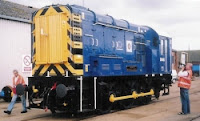
Fast-forward to July 2007, when this new diesel locomotive at the Port of Felixstowe was named in the captain's memory.
Below: another reenactment from a different period of history.
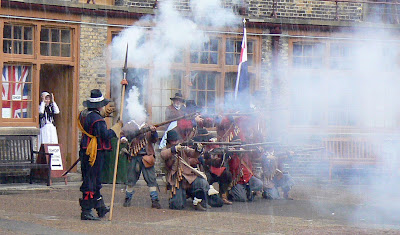
Thursday, 25 October 2007
The Brontës' local pharmacy
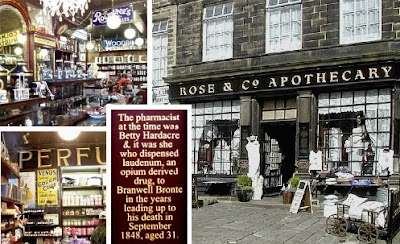
The Old Apothecary, at the top of the steep High Street in Haworth, Yorkshire, has been restored to resemble its appearance when the famous Brontë sisters and their wayward brother lived in the village. The shop now does a good trade selling perfumery, lotions and other items to the tourists who flock there. I have stayed in the guest house on two of my visits to Yorkshire.
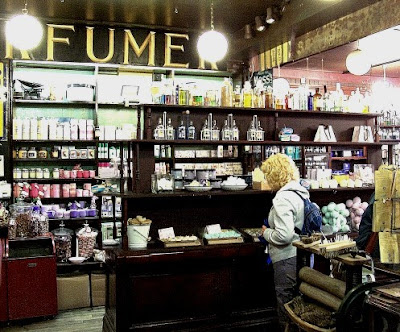
Labels:
apothecary,
Brontë,
guest house,
Haworth,
people,
shop,
Yorkshire
Summer events discussed on the Forum
The Maritime Heritage celebration (see older posts, below) was also discussed on Wordsweb Forum this summer. Anyone with memories or photographs of places or events they would like to discuss may join the group.

Fun for the children at Woodbridge Martitime Heritage event.
While some enjoyed testing the craft of the coracle maker, others did what kids do best, 'mucking about' in the mud at low tide. Woodbridge, once a thriving port at the tidal head of the River Deben in Suffolk, now heavily silted and unsuitable for commercial navigation, has become a popular leisure resort but the locals still take their maritime heritage seriously. The old tide mill (top picture) which used the power of the rising and falling tide to grind corn, has been restored as a heritage centre.



Subscribe to:
Comments (Atom)



